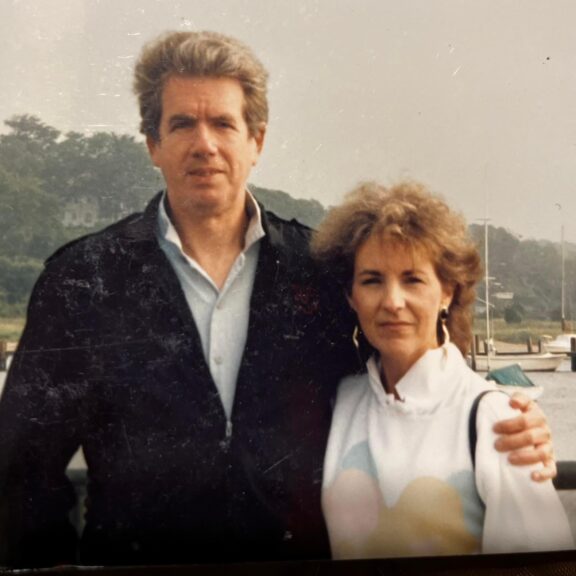Edward Morris is a prolific writer, author, poet, playwright, and renowned country music journalist. A longtime editor of “Billboard Nashville,” he also wrote for Country Music Television into his 80s until COVID caused significant layoffs. This music industry insider offers an intriguing look at his career as well as his unconventional love story and caregiving journey for his late wife Norma.

Q. We met back when you were editor of “Billboard” in Nashville, and I was a publicist at TNN: The Nashville Network. How many years were you at “Billboard?”
I was at “Billboard” for 14 years between 1981 and 1995, the last five as a country music editor. Boy, those were some interesting times.
Q. What do you remember as among significant highlights during those days?
The first one was that I was able to meet the Grand Ole Opry stars that I’d listened to as a boy, and to meet Ernest Tubb, Roy Acuff, Pee Wee King, Eddy Arnold, and Minnie Pearl, even Herman Crook, of the Crook Brothers, who was one of the original acts of the Opry. That was a big deal for me, probably more than even meeting the contemporary country stars because I met them sort of on a business-like basis. But the others, I just stood in adoration.
Morris continues to speak about his love for music and laughingly shares career highlights including a very surprising situation when he was laid off from “Billboard” and later rehired. The story behind the scenario and the “experimental science” that had him in a situation he likened to purgatory offers interesting food for thought.
Q. As a writer, storyteller, and playwright, where do you find your inspiration?
Politics and religion — which have never brought out the best in humanity. I like words… I listen to words, listen to people talk, listen to cliches. The inspiration is just everywhere. I sort of see writing as a performance. You know, you hear musicians say that they would do it for free if they weren’t paid for it. And I feel the same way about writing. I love to write with the anticipation of amusing people or getting arguments started or whatever. You know, I have a dream and I’ve got a blog. Anything that happens if you treat it right can be turned into a piece of prose. And, that’s what I do.
Q. You wrote for Country Music Television well into your mid-80s. Why was that important to you?
CMT … I was there from 1999 until 2020. And, it was the easiest job I’ve ever had. All I had to do was just cover country music and especially the number-one parties. And so, in my 20 years with CMT, I don’t think I was in their office more than five times. I worked from home, and I got to see the internal gears of the music industry, and virtually anything that I wanted to cover, they let me cover. So, I was always out at events and parties, and award shows and all that. And, as I say, you get to appreciate the backstage part of the industry when you have a job like that.
Do you go to concerts or seek entertainment now that you’re not writing for CMT?
No, I don’t. … But, I miss the free drinks most of all… I miss them (the concerts) but I don’t. I’m pretty much divorced from the industry now by necessity.
Through his wit and candor, he continues and elaborates on how age and transportation pose challenges to getting around Nashville.
Tell us about the book “Stardust” and the love story that you wrote about caring for your now-late wife Norma.
I didn’t plan it that way, but as it turned out, I began writing the blogs. I realized it took a great deal of pressure off the, you know, the tragedy of seeing Norma decline…
In one of my incarnations, I reviewed books for a publication called “BookPage,” here in town. I had reviewed a book for them on Alzheimer’s, and at the time this was long before Norma showed any signs. As I read the book it was almost like being beset by claustrophobia. It seemed like it must be the worst fate in the world to have Alzheimer’s. I was surprised — although I’m sure it was the worst fate for Norma. I was surprised that being able to write about it seemed to me to let a little light in. … And I wanted to make one point clear. Sometimes the caregiver comes out as some kind of heroic figure. I was not that. All my family, all my three children and six grandchildren, and five great-grandchildren live here in Nashville. I had all sorts of help taking care of Norma. So it wasn’t, you know, me against the world or anything like that. But there were great moments in an otherwise tragic story.
On our podcast, Morris expands on how a nudge from friends and the ease of Amazon helped propel his blogs to become a book. He also shares the emotion of his caregiving journey and how the pop music of the 1950s and Willie Nelson’s “Stardust” played a strong role in his and Norma’s life.
What would you tell your younger self?

Observe more. I have all my life lived so much in my own head. I joke that my brain is my entertainment center …
Listen to this interview to learn where Edward Morris finds his inspiration including the role Uber and TikTok have in his life. From prose to plays, his book “Stardust,” and a new column in the “Kingston Springs Gazette,” this is a man to watch and appreciate for his keen ability to notice the unique and to share it with wit, wisdom, and storytelling prowess. Now in his late 80s, Morris discusses the difficulties of life, and the benefits of family, as he offers a stroll down memory lane.

This Squeeze the Day is brought to you by the All of Us Research Program from the National Institutes of Health. Learn how you can help change the future of health by participating in the program.
Visit joinallofus.org to learn more.



